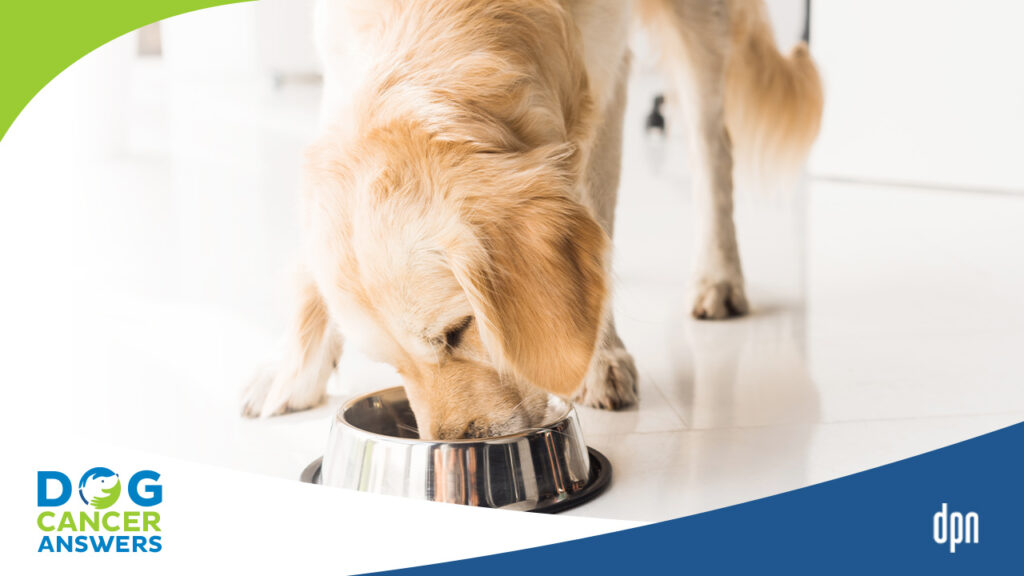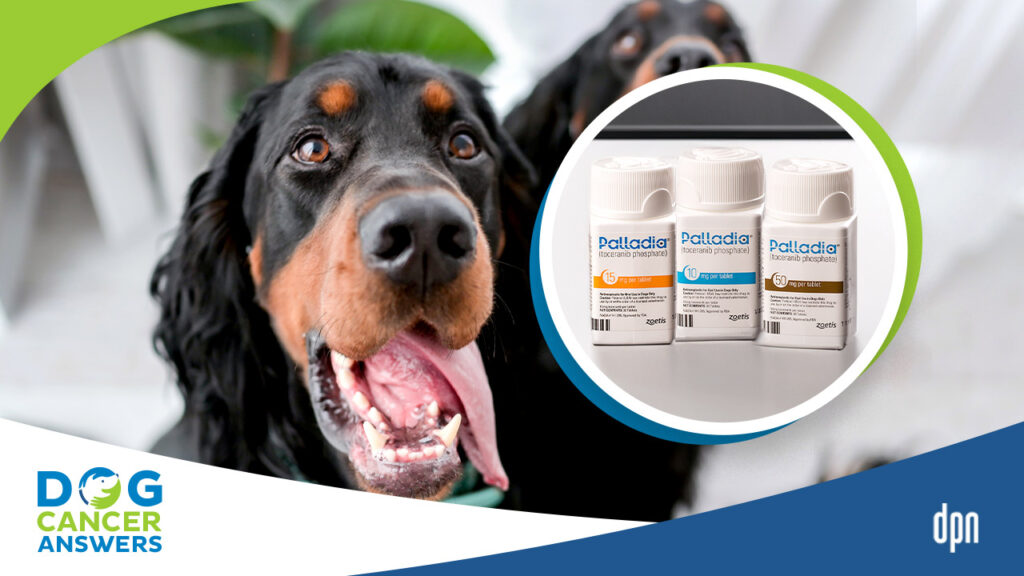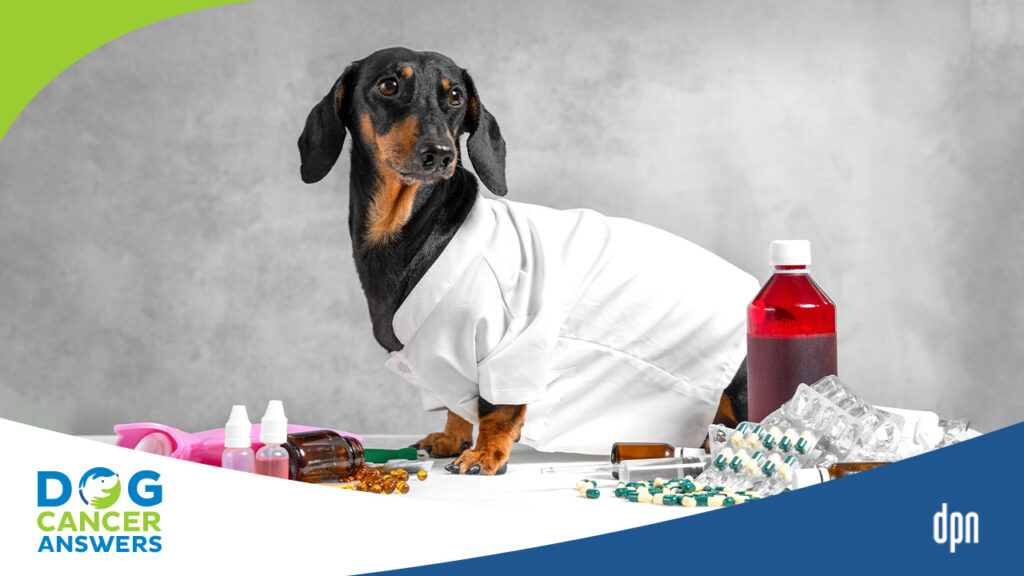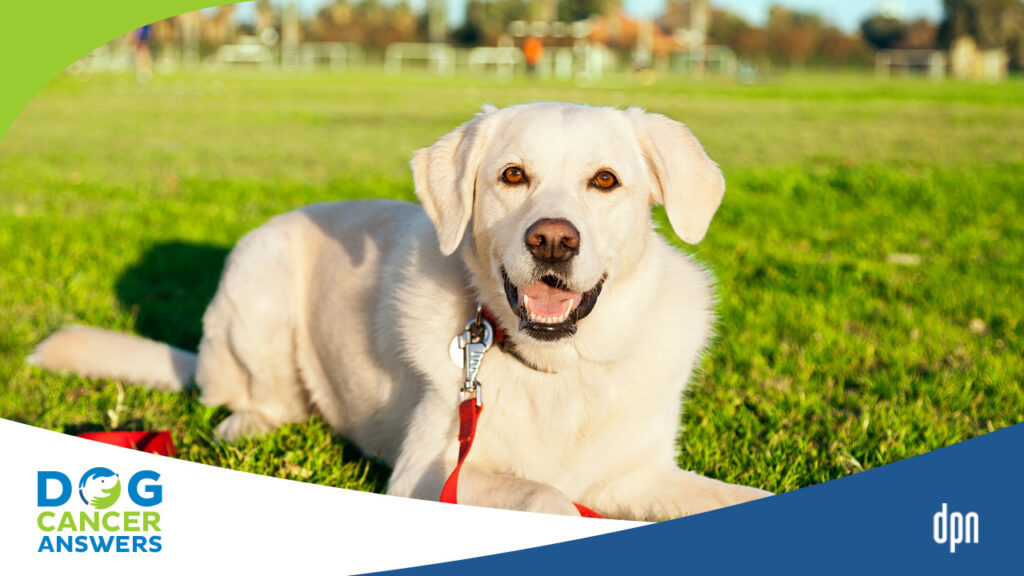EPISODE 60 | RELEASED June 5, 2020
Prednisone for Dogs – Uses, Benefits, and Side Effects | Dr. Tammy Powell Deep Dive
Prednisone for dogs: miracle drug, or side effect nightmare? It’s used for dozens of problems, including several cancers. And there’s a lot to know to use it wisely and well.
SHOW NOTES
Pred: miracle drug, or side effect nightmare? It’s used for dozens of problems, including several cancers. And there’s a lot to know to use it wisely and well. Let’s do a Deep Dive and find out about when and how it’s used, what the common and long-term side effects are, and how to make solid choices for YOUR dog.
>> Dr. Tammy Powell: Prednisone is actually doing something pretty great for your dog. You know, whether your dog is not a candidate for another treatment or whether there’s another factor.
>> Announcer: Welcome to Dog Cancer Answers where we help you help your dog with cancer. Here’s your host, James Jacobson.
>> James Jacobson: Thanks for hitting that play button, I am glad that you’re here because today’s episode is on a very important topic: prednisone—often referred to simply as pred.
Prednisone is a “go-to” drug for many problems in veterinary medicine, including for lymphoma and other cancers. So today we’re talking to our Full Spectrum veterinarian friend, Dr. Tammy Powell, who’s here to summarize her super-comprehensive, like term-paper length article on DogCancerblog.com about prednisone: it’s uses, its benefits, and it’s side effects.
>> James Jacobson: Tammy Powell, thank you so much for being with us. You are a graduate of the University of South Carolina, and you went to vet school at the University of Georgia and you’ve been in practice or clinical practice for seven years.
Great to have you on the show today, thanks for being here.
>> Dr. Tammy Powell: Yeah, absolutely. It’s good to be here.
>> James Jacobson: You wrote a sensational article. Basically, I think it’s like the mega article about prednisone. It’s everything anyone who is a dog lover needs to know about prednisone on dogcancerblog, and we will link to it from the show notes of today’s episode. But I guess let’s start with the most basic question.
What is prednisone?
>> Dr. Tammy Powell: Prednisone is probably one of the most commonly used drugs in veterinary medicine, because it can help with a wide variety of diseases for pets, for both dogs and cats. It’s actually a type of steroid, but it’s not what you might think of — a lot of people, when I said that they thought I meant testosterone
>> James Jacobson: Yeah, I mean is this something to bulk up, and so that your dog can do more pushups.
>> Dr. Tammy Powell: It’s actually not, where I practiced in Florida, we did have a lot of pitbulls who are very muscly, very energetic, and sometimes people would ask me, are you sure you want to give this dog a steroid? Those types of hormones are steroids too, but this particular kind, produced by the adrenal glands is called a corticosteroid, which means it comes from the cortex of the adrenal gland.
And within that category specifically, another long word here, it’s a glucocorticoid. So that’s one that is involved in fighting inflammation, it’s also part of the body’s fight or flight stress response. So if you have that response in your body, your body releases cortisol, which helps you mobilize sugars, energy stores, shuts down certain non-essential processes so you can focus on that fight or flight completely. And it’s used to help with anything related to inflammation.
>> James Jacobson: So why is prednisone prescribed so often? You said so commonly used why?
>> Dr. Tammy Powell: Just because of the variety of things that can help within the body, um — inflammation’s pretty prevalent — that can affect so many different parts of the body in both pets and humans. And, you know, I’d probably have a whole podcast episode going over all the different conditions it can help with, but some of the most common ones I’d use it for would be allergies. And again, practicing in warmer climates, that was something we saw all the time, whether it was pollen and environmental allergies, or flea allergies, another really common one. And some of these dogs were just very uncomfortable itching day and night, itching until they made hotspots and their skin got infected. So they need, these, prednisone was very important for some of them. There are other options too, but some dogs did need prednisone.
Some other common examples would be anything autoimmune, that could be irritable bowel problems, that could be lupus.
>> James Jacobson: Let’s talk about it specifically as it relates to cancer, because it is used a lot in cancer treatment. Why?
>> Dr. Tammy Powell: That is true. Lymphoma is one of the most common, but there are a few different ways it can help. It can actually be part of the chemotherapy protocol directly. It actually does have some anti-cancer properties in things like lymphoma or mast cell tumors. Lymphoma affects lymphocytes and mast cell tumors affect mast cells. These are both part of the immune system and can contribute to inflammation in the process of fighting diseases. And when you have cancers of these cells, prednisone can be directly relevant for them, but prednisone can also be used for a variety of cancers, just to help with inflammation, which is present.
>> James Jacobson: I know that pred is often used in different chemotherapy regimens like the CHOP protocol for lymphoma.
>> Dr. Tammy Powell: CHOP is four different drugs. Three of them are what you might think of as more traditional chemotherapy agents. And then the P in CHOP is for prednisone.
>> James Jacobson: I won’t even quiz you. I think Dr. Ettinger told me, do you want to even do what all the other four letters are cause they’re hard, I know, but the P is easy. Cause it’s prednisone.
>> Dr. Tammy Powell: It’s a little odd because they don’t necessarily start with the letter you think, or the brand name is used instead of the generic name to make that CHOP acronym.
But yeah, prednisone is an important part of that, but the schedule is very specific and so, most oncologists recommend you don’t start lymphoma before chemotherapy.
The reason is prednisone can cause drug resistance so chemotherapy will be less effective. And there are other reasons too, it can make it more difficult to diagnose the specific type of lymphoma, but that drug resistance is a big one. So always remember to check with an oncologist first, to see all your options for lymphoma.
>> James Jacobson: What types of other cancers might it be used for?
>> Dr. Tammy Powell: One that I would see happen more often than not was with neurological cancers, brain tumors, especially — and part of the reason is if you have a mass growing in a confined space within the skull, within the spinal cord, there’s really no room for a mass.
So if you have one growing, it can compress those very important organs. So surgery is an option for some, but regardless of surgery or not, sometimes you still need to shrink that mass and there are other drugs you can use for it, but prednisone is a very common one.
Another one might be a mass on the outside of the body. If it’s inflamed and growing quickly, prednisone can reduce it a little bit to make the surgery a bit easier so that not so much has to be cut away. Again, this depends on the type of mass. It’s not going to help with everything, but when it does, it can be really beneficial.
>> James Jacobson: Now I know that, uh, pred kind of stimulates appetite,
>> Dr. Tammy Powell: Yes.
>> James Jacobson: Which I guess would be important if your dog is not eating.
>> Dr. Tammy Powell: That’s very true. Sometimes dogs have what we call cancer cachexia. And that term basically means that they’re not eating a lot. And because of the stress on their body of the cancer, they do lose weight more quickly. They can be kind of wasting away, so to speak, loss of muscle, loss of body mass and they do need to take in calories, but sometimes they’re just not feeling well, whether that’s from the cancer itself or from chemotherapy, both can cause the dog to not feel well. Maybe be a little nauseous, not hungry and prednisone can, in addition to making them feel a little better by decreasing some of that inflammation that can actually increase the appetite. That’s actually one of the most common side effects we see, but in this case it’s a beneficial side effect so it can really help that dog.
>> James Jacobson: Now I know there’s this concept of what is it called? Pred and pray? I mean, basically it’s just sometimes used for palliative care only.
>> Dr. Tammy Powell: Palliative care basically means we’re not curing the disease, but we’re helping the dog to feel better. So this can be considered a little bit like hospice care, although many dogs are actually very active during palliative care. So whether they’re resting a lot or active, that can still be palliative care.
And some people look at this as giving up, especially if it’s taken over a more standard option such as a full chemotherapy protocol, but that’s actually not true. It’s actually doing something pretty great for your dog. You know, whether your dog is not a candidate for another treatment or whether there’s another factor, like maybe someone in your house is pregnant and you can’t do chemotherapy, or the cost is prohibitive. It’s absolutely still an okay option to do something like palliative care and that can make your dog feel much better. Really, it’s more about quality of life and that’s one of the best things you can do for your dog.
>> James Jacobson: And this is a good place to pause to hear from our sponsor, and when we come back we’ll talk about side effects to watch for with prednisone.
Today’s episode of Dog Cancer Answers is brought to you by the best-selling animal health book, The Dog Cancer Survival Guide: Full Spectrum Treatments to Optimize Your Dog’s Life Quality and Longevity by Dr. Demian Dressler and Dr. Susan Ettinger (an oncologist in New York). And in a minute I will tell you how to get their book at a discount.
Whether you are looking to use every treatment possible or just focusing on palliative care – or something in between, like I do with my dog – you’ll find actionable information in this book. You’ll get behind the scenes information on everything from chemotherapy to surgery to supplements to diet, plus tons of supportive information about how cancer works and how to handle the emotional overwhelm that comes with a diagnosis.
The Dog Cancer Survival Guide is available wherever fine books are sold– both online and in physical bookstores. And you can support this podcast by using a coupon code and getting The Dog Cancer Survival Guide right away direct from the publisher. Its available either in paperback (and there is free shipping to any US address). OR as an e-book edition that is under ten dollars.
The website to get either the paperback or the ebook is: DogCancerBook.com.
And you can save 10%… if you use the promo code “podcast” when you check out, you’ll save 10%. The website again: DogCancerBook.com. Use the promo code “podcast” for 10% off. That is www.DogCancerBook.com.
Welcome back. What about the side effects from pred. Is there a balancing situation between that and the cancer itself?
>> Dr. Tammy Powell: There are some side effects that almost always happen, and that would be the increased appetite, in addition to that, classic side effect that we see in almost every single dog is going to be increased urination and increased thirst, and that’s something they can’t control. The prednisone causes that. So you do have to keep water around for your dog. They can’t control the amount of urination. So if you don’t keep water, they can get dehydrated. And they may need walks more often.
Even well-trained dogs may have accidents if they’re trying to hold it in for too long,
>> James Jacobson: Because it just makes them want to urinate more than normal and that they can’t control it. Let’s talk about the pain control components of prednisone. It’s effective for that?
>> Dr. Tammy Powell: It can be, but one important caveat to note here is that it’s not actually a pain medication. So by itself, it’s a poor pain control usually, but it can be used in combination with other pain control medications. And the reason that it’s used in combination is because it addresses the inflammation component.
So for example, if you have a dog with arthritis, it’s not going to make that arthritis pain go away, but it can stop some of that inflammatory process, especially if it’s a newly diagnosed condition. And then it’s combined with other pain control medicines to address the pain directly.
>> James Jacobson: Now I know that you’ve practiced veterinary medicine all over the world. Have you seen people use pred in novel ways?
>> Dr. Tammy Powell: In novel ways, that’s a good question. In some countries where maybe there’s less access to certain medications, I have seen prednisone used as a post-operative medicine, which is something given for pain control. And I believe that used to be done here. I have heard of some veterinarians doing that in the U.S., too, but it’s a little bit outdated because we know more about it now.
So while it helps with inflammation, you do need something for the actual pain of the surgery too.
>> James Jacobson: Is pred ever considered dangerous for dogs?
>> Dr. Tammy Powell: It can be. Some of the things we’ll see short term, there’s very little risk, even if they eat extra doses, that’s unlikely to be toxic, you know — still good to check with your vet if your dog gets into the bottle and eats more than they should.
>> James Jacobson: They’re not treats.
>> Dr. Tammy Powell: Exactly. Fortunately the risk of toxicity is low and used short term, prednisone is usually pretty safe.
It’s really the longterm side effects we worry about. Some things that can happen or problems with the liver, risk of diabetes, because it elevates the blood sugar levels. And we also see effects on the adrenal function.
If the adrenal glands are used to getting this external supply, they can actually really ramp down their own natural production of cortisol. And there’s a condition called Addison’s disease, which is the reduction in these corticosteroids produced by the adrenal glands.
Addison’s disease, it can be quite dangerous. It happens naturally in a lot of breeds standard poodles are a common example, but what happens, since they don’t have that cortisol for the fight or flight response, actually their body doesn’t respond well to stress. So stressful events, whether that’s another illness or even something as mundane as boarding, if they don’t like being away from home, the dogs can actually die during those times.
>> James Jacobson: I had a dog that was on pred for a long time, for a really unusual eye injury or an eye thing where it’s SARS or something like, SARS, this was basically where
>> Dr. Tammy Powell: The retinal problem?
>> James Jacobson: It was a really weird thing. And the ophthalmologist said, well, basically, we’re going to put your dog on pred for the rest of her life.
And she was a senior dog and I was like, Whoa, I heard that’s really bad. But she said, well, basically it’s an equation that you just have to sort of figure out. You either do it or you don’t. But, I really think it’s something that you should do and talk about that discussion that a veterinarian will have with the client.
>> Dr. Tammy Powell: The thing about prednisone is it helps with a lot of things, but it shouldn’t necessarily be a knee jerk reaction to use it. You have to kind of look at every pet, every dog as an individual, and a few things would go into that consideration. That one would be any underlying medical conditions they might have.
If your dog was diabetic, they may have needed something else, cause that could have thrown their diabetes out of control. They’re taking another medication that’s not compatible, you may need to switch to something else, either something not prednisone or change the other medication. One good example is nonsteroidal antiinflammatories. And these are kind of the doggy equivalents of ibuprofen, you know, safer alternatives for them,
>> James Jacobson: But don’t give your dog over the counter human ibuprofen.
>> Dr. Tammy Powell: Thank you for pointing that out. We have formulations for dogs but you should not give human medications like that without checking with your vet, they can be very toxic for pets. So always check first.
The one other reason you can’t combine that one — and it’s one that we always remember not to mix — is that they both cause stomach ulcers in some dogs. And if you combine both of them, the risk of stomach ulcers really goes up. And some other factors to consider are the condition your dog actually has.
Is there something else to treat it available, sometimes there’s not. Also have you determined for sure that that’s what your dog has? So for example, if your dog, if you thought they had allergies, but they actually had the skin mite called demodex, which can have a similar type of symptom.
>> James Jacobson: Say that again?
>> Dr. Tammy Powell: It’s called demodex. It’s a microscopic mite. It lives on the skin normally, but when it overgrows, it can cause itching, hair loss, and look a little bit like allergies. But if you assume it’s allergies without testing and you give your dog prednisone that demodex is going to get much worse really quickly. So it’s important to determine that your dog actually has a condition that needs prednisone and not something that would respond badly to it.
>> James Jacobson: So when my dog was on pred, I noticed that after a while her stomach became sort of distended. Do dogs get fat on prednisone?
>> Dr. Tammy Powell: They can. In the short term, that’s usually due to that increase in appetite. They just are hungry all the time. In the longterm there can be some effects on metabolism, it can affect their thyroid hormone and also kind of create what we call iatrogenic, which means it’s caused by the medication or treatment. Cushing’s disease and natural Cushing’s disease is the opposite of Addison’s, it’s too much cortisol in the body. So you kind of get that weight gain in the belly. They’re feeling a little bit sluggish, they’re more prone to things like urinary tract infections, maybe a little bit of hair loss, things like that.
So that’s possible with long-term use. But I’d say for a lot of dogs, especially if it’s in the short term use that main, the main reason is going to be cause they’re hungry and they just want to eat all the time.
And even dogs. I’ve seen them gain weight in a couple of weeks of use. Very short-term use.
>> James Jacobson: And it’s not just hunger. I mean, we talked about the urination part, but they actually drink more. Right.
>> Dr. Tammy Powell: That’s true. They do. Cause they’re stimulated to urinate more. If they need to drink more, to keep up with that and they feel thirstier, too.
And that can be amplified if it’s hot outside.
>> James Jacobson: Now, it’s been a long time since I used pred with the dog I was talking about. But as I recall, I think I used a little bit of Pepcid AC every time I gave the pred, would that make sense? Is there a reason to do that?
>> Dr. Tammy Powell: That reduces the risk of stomach ulcers, cause prednisone can increase stomach acids. This is common if you’re giving it with dogs with certain cancers, such as mast cell tumors, which increase stomach acid too.
So check with your vet for their specific recommendation, and of course the dose. Not every single dog will need it, especially in the short term, but if your dog’s got a sensitive stomach, it’s probably a good idea to check.
>> James Jacobson: Tell me a little bit more about what it could do to the liver.
>> Dr. Tammy Powell: Given over the long-term, it can cause liver problems, liver disease, you know, cause any drug you give depending on the organ that processes, it, it can be a lot of work on that organ. But, and the interesting thing about prednisone, we monitor the blood chemistry values just to check these sorts of things.
Be sure the liver is okay, that kidneys are okay too, but it can actually cause a false positive, a false increase in one of the liver values, what we call ALP or alkaline phosphatase
>> James Jacobson: ALP, say that again, ALP is what?
>> Dr. Tammy Powell: Alkaline phosphatase, and this enzyme, as opposed to direct damage to the liver, which we usually rely on another liver enzyme to tell us, ALP is usually more an indication of backup, like for a gallbladder problem. For example, if you have bile in the liver, that would increase it too.
So sometimes this can indicate a problem, but sometimes it’s actually a false positive because the prednisone produces something similar that falsely increases the value — actually can be elevated in older, younger dogs, too, specifically seniors, it goes up. We don’t know all the reasons why, and growing puppies, there’s an enzyme produced by the bones that’s very similar and can again produce a false positive. So one way to tell the difference is monitoring over the long term and looking at your dog’s overall health.
>> James Jacobson: How frequently should you be monitoring? How frequently should you get the blood test for the liver?
>> Dr. Tammy Powell: It depends a little bit on the dog. I’d say every six months is average for a longterm user. Some dogs are doing really well and may go up to a year and some dogs that are a bit older, or may have other underlying conditions that we want to monitor, it may be bumped up to every two or three months.
>> James Jacobson: Now is it an expensive test?
>> Dr. Tammy Powell: That is a good question. I guess it
>> James Jacobson: It depends on your vet.
>> Dr. Tammy Powell: Depends what you consider expensive.
>> James Jacobson: But I mean, is it a complicated test? Is it basically just a little blood test? Do they have to send it off to a lab or do they do it in the clinic?
>> Dr. Tammy Powell: It depends on the clinic. Some have in house labs available and some send it out. But I will say this is one of the most common blood tests we do. Usually if you want to just screen a dog’s overall health, it’s part of what we call a blood chemistry, which can be bigger or smaller, but even the smallest panels usually check their liver values, their kidney values, electrolytes, key electrolytes and blood glucose or blood sugar.
>> James Jacobson: Okay. So let’s sort of review in terms of the factors to consider when determining if a dog is a good candidate for prednisone.
>> Dr. Tammy Powell: What the underlying medical condition is. What medicines they’re on. And if they have another health problem that would contraindicate it, some other factors would be individual, you know, with any drug you give, there are some individuals that just don’t process it well.
And even without an allergy, sometimes a body just reacts poorly to it. And it may be some genetic factor that we don’t know all the reasons behind, but fortunately, that sort of thing is pretty rare with prednisone.
But I have had a few patients I prescribed it to that just felt the side effects a lot more than other dogs did, and they weren’t good candidates. Like some got stomach ulcers.
>> James Jacobson: Would that be a function of size or breed or are just totally just luck of the draw?
>> Dr. Tammy Powell: I think it’s luck of the draw. Nevertheless I think, dogs I saw with severe stomach upset or even stomach ulcers for whatever reason, tended to be larger dogs, such as Labrador, golden retriever. So we ended up really reducing the dose and then looking into more alternatives for them.
>> James Jacobson: Cause that is something that you can do. The dose can be tweaked. Pretty significantly to have — to minimize some of the side effects, right?
>> Dr. Tammy Powell: That’s true. One of the things that’s interesting about prednisone is we’ve got a couple of different dose ranges: we have an anti inflammatory dose, which is a bit on the lower side.
And then we have an immunosuppressive dose and this would be given to pets with autoimmune diseases, especially for autoimmune diseases that are considered emergencies. One example would be, IMHA that stands for immune mediated hemolytic anemia. And that basically means the body is destroying its own red blood cells.
That can be life threatening and it can happen pretty quickly. So we have to give a very strong dose of immunosuppressive drugs.
>> James Jacobson: So there’s a lot of variety in terms of dosing, how much you want to use, how little you want to use, what’s the right amount. How is that figured out?
>> Dr. Tammy Powell: That will vary from dog to dog. It’s based on weight and whether they just need a little bit of anti-inflammatory or they need that immunosuppressive dose.
But the nice thing is we try to find what we call the lowest effective dose. So even if you have a starting point your veterinarian will usually work with you to find the lowest dose that’s going to be still effective for your dog, but will reduce the amount of side effects, especially for the long-term.
And usually a lot of dogs can get to taking it just every other day and that minimizes side effects.
>> James Jacobson: So when I saw those side effects with my dog, I wanted to stop pred, but Dr. Dressler freaked out a little and was really clear with me that I should never stop cold turkey, right? Can you talk about the reason that you should only stop when your veterinarian tells you to? Isn’t it important to taper off?
>> Dr. Tammy Powell: The reason is because that Addison’s disease – If your dog’s been taking it quite a long time, their body may not be producing as much cortisol as it used to because it’s so used to getting this external supply and if you stop that cortisol supply, suddenly it could be life threatening. They can have even just things that cause stress be fatal just because their body’s not able to handle that stress response.
>> James Jacobson: So, there’s just so much pred, and it’s just one of these drugs that is used with so many different things, but it’s often used with cancer. Dr. Tammy Powell, thank you. This is, as I said, it is the motherload of information and you did an amazing job. I think it’s wonderful. And if you ever are wondering, anything about prednisone and your dog, please check out her blog post on dogcancerblog. We will put a link to it in the show notes. Dr. Tammy Powell, thanks for being with us today.
>> Dr. Tammy Powell: Thank you.
>> James Jacobson: So, there you have it, there it is: our Deep Dive discussion on prednisone with Dr. Tammy Powell. I’ve never really understood before why it’s used for so many problems, but I guess it makes sense. It makes a very clear, immediate difference to a lot of dogs, and even though there are some side effects — like hunger, and thirst, and increased urination — those are manageable. And I can personally attest to the long-term benefits with my dog, who was on it for about five years before she died. It really did keep her kicking and feeling good for much longer than she would have otherwise.
Like most dog lovers, I didn’t like the side effects, though. But now I get why Dr. Dressler was so, let’s call it “stern,” when I told him that I wanted to stop cold turkey. He didn’t want her to go into shock over something small and die.
If you are looking at using pred with your dog, definitely read Dr. Powell’s article on dogcancerblog, which will be updated as time goes on if things change. It really does tell you even more than we were able to cover today. I think this is a must-read if you’re thinking of using this drug with your dog.
Links to that are in the show notes, which are in your podcast app or at DogCancerAnswers.com.
If you’re appreciating what we do here at Dog Cancer Answers, the best way you can support this free podcast for dog lovers facing dog cancer is to subscribe in the app of your choice and tell a friend or even your own veterinarian about the show. The more ratings, and reviews, and listens, and subscriptions we get, the easier it is for to be found by other dog lovers who really need this information.
And hey, if your personal veterinarian is like our other veterinary guests, maybe they should be on our show. Next time you see them, maybe plant the idea that they could be destined for greatness – or at least for a guest slot on our show. All they have to do is contact our producers via our website: DogCancerAnswers.com.
<<TOUCH TONE SFX>>
And those touch tones remind me to remind you that our veterinarians are “on-call” at our Listener Line. If you have a question for a dog cancer vet, please call our listener line and record your question. We will pose it to one of our veterinary experts (and as an experiment for just a limited time– we’ll email you the vet’s answer to your question as soon as we get it). After that, your question and the answer will appear on a future episode of Dog Cancer Answers. The telephone number Is 808-868-3200 or visit our website at DogCancerAnswers.com.
Let me take a moment to thank our sponsor: The Dog Cancer Survival Guide book by Demian Dressler and Sue Ettinger. The book is available wherever fine books are sold both online and in physical bookstores. And remember, if you would like to help support this podcast, get the book today– direct from the publisher, Maui Media. The website again: DogCancerBook.com and use the promo code “podcast” for 10% off. That is www.DogCancerBook.com.
Stay tuned to our podcast feed for the next episode of Dog Cancer Answers. And remember the best way to make sure you get it as soon as it is released is to subscribe in Apple Podcasts or on your favorite podcast app. We are also on Spotify and YouTube.
I would like to thank Dr. Tammy Powell for being our guest today.
Until next time, I am James Jacobson. From all of us here at Dog Cancer Answers, & Dog Podcast Network–I wish you and your dog a warm Aloha.
>> Announcer: Thank you for listening to Dog Cancer Answers. If you’d like to connect, please visit our website at DogCancerAnswers.com or call our Listener Line at 808-868-3200.
And here’s a friendly reminder that you probably already know: this podcast is provided for informational and educational purposes only. It’s not meant to take the place of the advice you receive from your dog’s veterinarian. Only veterinarians who examine your dog can give you veterinary advice or diagnose your dog’s medical condition. Your reliance on the information you hear on this podcast is solely at your own risk. If your dog has a specific health problem, contact your veterinarian.
Also, please keep in mind that veterinary information can change rapidly. Therefore, some information may be out of date.
Dog Cancer Answers is a presentation of Maui Media in association with Dog Podcast Network.
Hosted By
SUBSCRIBE ON YOUR FAVORITE PLATFORM
Topics
Editor's Picks
CATEGORY







